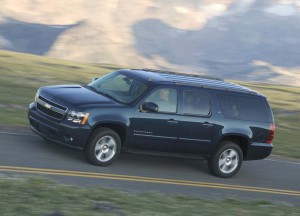Federal regulators have ended a five-year probe of rusting brake lines involving 5 million older General Motors vehicle. Ruling it found no defect, the National Highway Traffic Safety Administration has instead put the onus on owners to deal with the potential problem.
The federal safety agency ultimately determined that motorists have been contributing to the problem by failing to wash road salt off of their vehicles, a problem primarily seen in Snowbelt states.
Excess corrosion has been a problem for a number of manufacturers in recent years. In some cases, such as those involving several Toyota products, NHTSA has ordered recalls. The agency is also facing complaints regarding some Nissan vehicles. But NHTSA has reversed course with the resolution of the GM investigation, indicating that owners need to take steps to keep their vehicles in a safe operating condition.
The feds received 3,645 complaints involving various Chevrolet, Cadillac and GMC pickups and SUVs sold during the 1999 to 2007 model-years. The vast majority of those complaints, about 75%, involved vehicles produced during the 1999 to 2003 model-years. The issue has been linked to at least 107 crashes and 40 reported injuries.
(Fiat Chrysler ordered to pay $150 mil due to Jeep fire death. Click Here for more.)
A complaint filed by a Middletown, Ohio man triggered the investigation when he reported the brake lines for his 2003 Chevrolet Silverado had begun to leak, causing a reduction in braking power.
But NHTSA has determined that the problem can readily be prevented by owners who simply wash their vehicles several times during the winter to prevent a build-up of corrosive salt from the undercarriage of their vehicles. Such a build-up can cause rusting of other vehicle components, including the suspension, exhaust system and the floor pan itself.
The new advisory covers owners in 20 Snowbelt states, including Connecticut, Delaware, Illinois, Indiana, Iowa, Maryland, Massachusetts, Maine, Michigan, Minnesota, Missouri, New Hampshire, New Jersey, New York, Ohio, Pennsylvania, Rhode Island, Vermont, West Virginia and Wisconsin, as well as the District of Columbia.
(GM CEO Mary Barra named one of world’s 10 most influential leaders. Click Here for the story.)
NHTSA has come under fire for taking about five years to complete its investigation. The agency acknowledged the slow process, noting it has become overwhelmed with safety complaints at a time when recalls are running at a record pace. The new NHTSA administrator is pressing Congress to approve additional funding, a matter receiving unusual bipartisan support in an otherwise politically divisive climate.
Excess corrosion has always been an issue for the auto industry, though manufacturers have taken steps to reduce the problem in recent years by switching to new metals, coatings and paint processes. Nonetheless, issues remain. Toyota has faced several recalls, including one involving minivans that could have exterior parts unexpectedly break off. Last October, meanwhile, Ford recalled more than 200,000 crossovers because corrosion problems could lead to fuel leaks and fires.
Nissan has been hit with complaints involving rusting floorboards on some of its models, including the popular Altima sedan, but the issue has not been labeled a safety defect by NHTSA.
(For more on the Ford recall, Click Here.)


Fuel and brake lines should not rust through even in the “salt belt” – in a reasonable time frame – say 10-12 years. Suggesting that consumers actually wash the undercarriages of their vehicles to prevent brake line rust through is a hopeless mandate. Most people are not going to do this.
What would be better advice is to explain to consumers that fuel and brake lines WILL rust through in approximately 10 years time if they are not proactive in washing the undercarriage several times per Winter in “salt belt” areas. Then consumers would have no one to blame and they would be more technically informed that they will need to wash or replace the fuel/brake lines in approximately 10 years.
Wow what a surprise the Fed dumping problems on the public.The Big 3 have been making crap for years. I wonder if the Fed ever interviewed real auto techs and ask them. Gas and brake lines should last longer than vehicle. Install cheap material and what happens. Road salt “really”